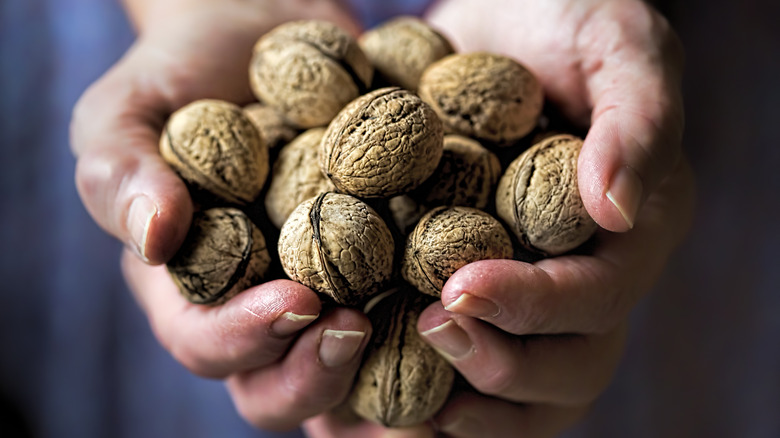The 3 Worst Eating Habits For Your Brain Health, According To Our Expert
We may receive a commission on purchases made from links.
Our eating habits determine a lot of things, including how we feel and how often we fall ill. But have you ever considered your brain health when it comes to your food choices?
You don't think about food habits that are actually hurting your brain until you're standing in a room in your home, wondering why you came in there. This is why the advice from Maggie Moon, a registered dietitian, brain health nutrition expert, and author of "The MIND Diet," who spoke exclusively with Health Digest, is important. Turns out, there are three things you do (or don't do) when it comes to food choices that you need to rethink if good memory, brain aging, and cognitive decline are important to you.
Number one has to do with the consumption of healthy fats: omega-3 fatty acids. Omega 3s are broadly classified as docosahexaenoic acid (DHA), eicosapentaenoic acid (EPA), and alpha-linolenic acid (ALA). "I can't overstate how important the right fats are for brain health," explained Moon. "When too much of the fat we eat is saturated and trans fats, the blood brain barrier can malfunction, leaving the brain vulnerable to oxidative stress and inflammation." It doesn't take a lot to look around and see options full of unhealthy fats (saturated and trans fats) that are easily available to us; think cakes, cookies, fried foods, red meat, butter, cheese, and ice cream. A diet rich in unhealthy fats and poor in healthy ones is associated with dementia risk.
Why omega-3s are important and how to get more of them
Giving your brain the right kind of fats helps prevent disease and boosts memory and learning. If you're looking for omega-3 ALA, which can't be produced by the body and can only come from your diet, plant foods should be your go-to, shared Maggie Moon. Walnuts are a particularly good source. Per a 2020 study published in Nutrients, walnuts are linked to suppressing inflammation and oxidative damage in the brain, both of which contribute to dementia. "Walnuts provide 2.5 grams of plant-based omega-3 ALA per serving," explained Moon, adding that she likes snacking on walnuts and apples. "[It] doubles as a quick and simple breakfast on busy days." Other good sources include seaweed, dried anchovies, and sardines.
Looking for and combining plant-based and animal-based (for those who want to) sources of omega-3s is a good way to ensure you're getting your recommended intake, per Moon. For ALA, the recommendation is 1.1 grams a day for women and 1.6 grams for men. As for DHA and EPA, it's 200 to 500 milligrams daily.
"When we make an effort to add brain-boosting omega-3 foods to our meals and snacks, there's naturally less room for the saturated and trans fats that can damage the blood-brain barrier and leave the brain vulnerable to oxidative stress and inflammation," shared the expert. Plus, omega-3s boost your heart health, and as Moon put it, "heart health is brain health."
Snacking on sweets can damage your brain
If you thought sweets were trouble only because of their unhealthy fat content, there's more. Added sugars hidden in the snacks we so often turn to — whether as food or drink — can also pose a threat to your brain, according to Maggie Moon. "The top sources of added sugars in the American diet are sugar-sweetened beverages, desserts, and sweet snacks," shared the expert. You can add cereals and candies to the list of foods that are damaging to your brain.
Per a 2023 study published in the Journal of Alzheimer's Disease, simple sugars (fructose and sucrose) are associated with a higher risk of dementia.
While snacking isn't as bad as you think, especially if it helps you stay true to weight loss goals and prevents overeating at your three main meals, the choices we make are important. "There's no point in trying to roll a boulder uphill — instead of trying to quit the habit or deny your sweet tooth, try replacing it with a naturally sweet treat. For example, pair prunes with walnuts, for fiber, minerals and brain-supportive omega-3 ALA; enjoy a smoothie made with antioxidant-rich berries; or snack on frozen banana slices dipped in dark chocolate," recommended the expert.
Skipping salads isn't helping your brain
Most Americans aren't consuming the right amount of vegetables daily, according to Maggie Moon. The USDA recommendation is two to three cups a day. "Skimping on vegetables, especially leafy greens, is associated with accelerated brain aging, cognitive decline, and risk of dementia," explained the expert. Your brain needs essential nutrients like vitamin K, lutein, folate, and beta-carotene, found in vegetables like kale, spinach, collards, and broccoli. Other brain-friendly nutrients in vegetables include vitamin E, polyphenols, and the carotenoids lutein and zeaxanthin.
A 2018 study published in Neurology found that consuming 1.3 servings of leafy green vegetables daily kept the participants' brains 11 years younger compared to those who didn't consume as much. A 2023 study in the same journal found fewer brain plaques associated with Alzheimer's disease in older adults who consumed more leafy greens. A good way to stay consistent with this habit is to "befriend the big box of pre-washed salad greens and add them to every meal," shared Moon, adding that she adds handfuls to soups, reheated leftovers, breakfast eggs, smoothies, etc. "Once you start looking for places to add greens, you'll find them everywhere."
Brain health is not just a concern when you start aging. It's good to start thinking about adding these foods to your daily diet to prevent cognitive decline. As for more foods to eat for brain health, berries, eggs, seafood, kimchi and other fermented foods, black beans, lean poultry, whole grains, and olive oil make the list, per Moon.




